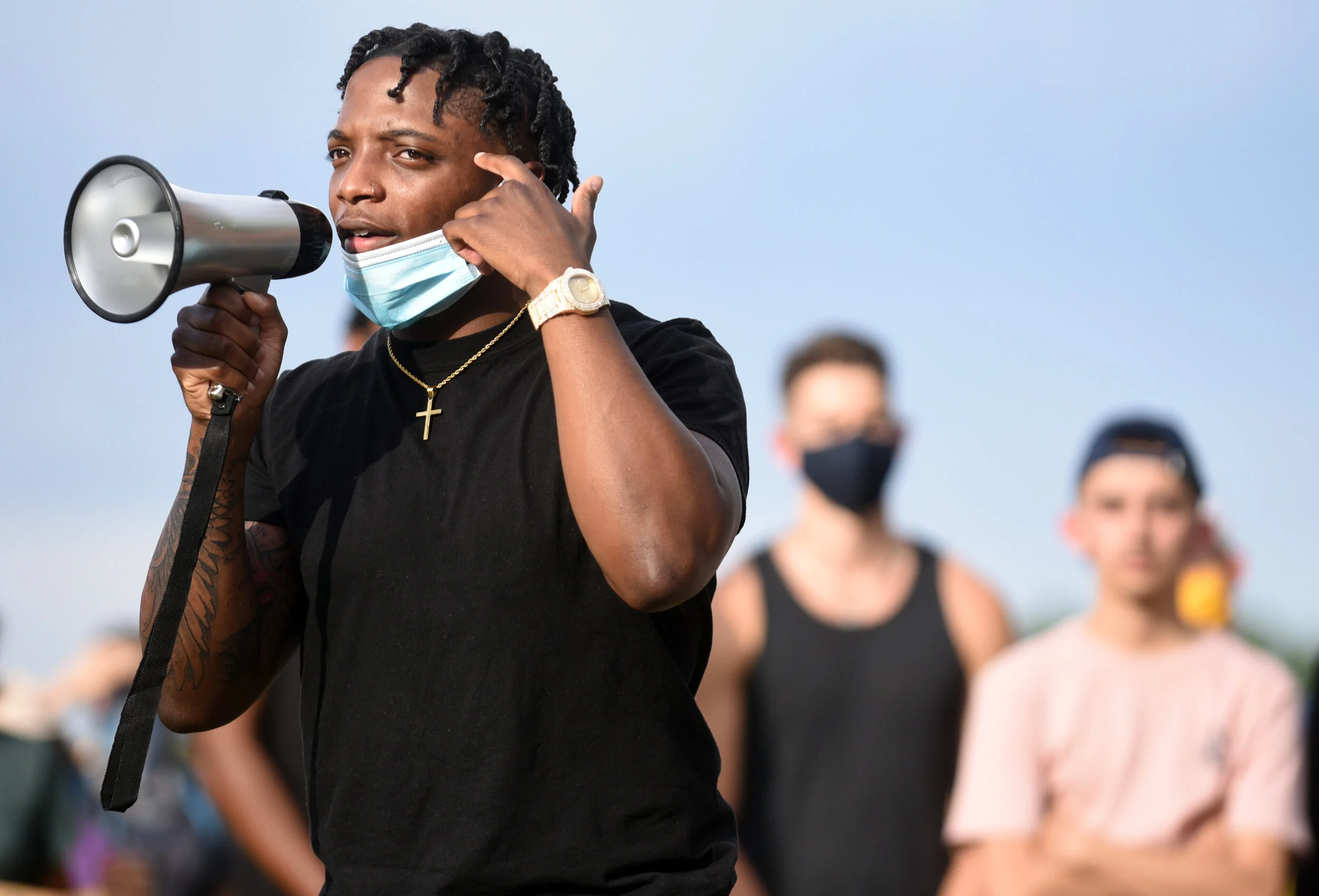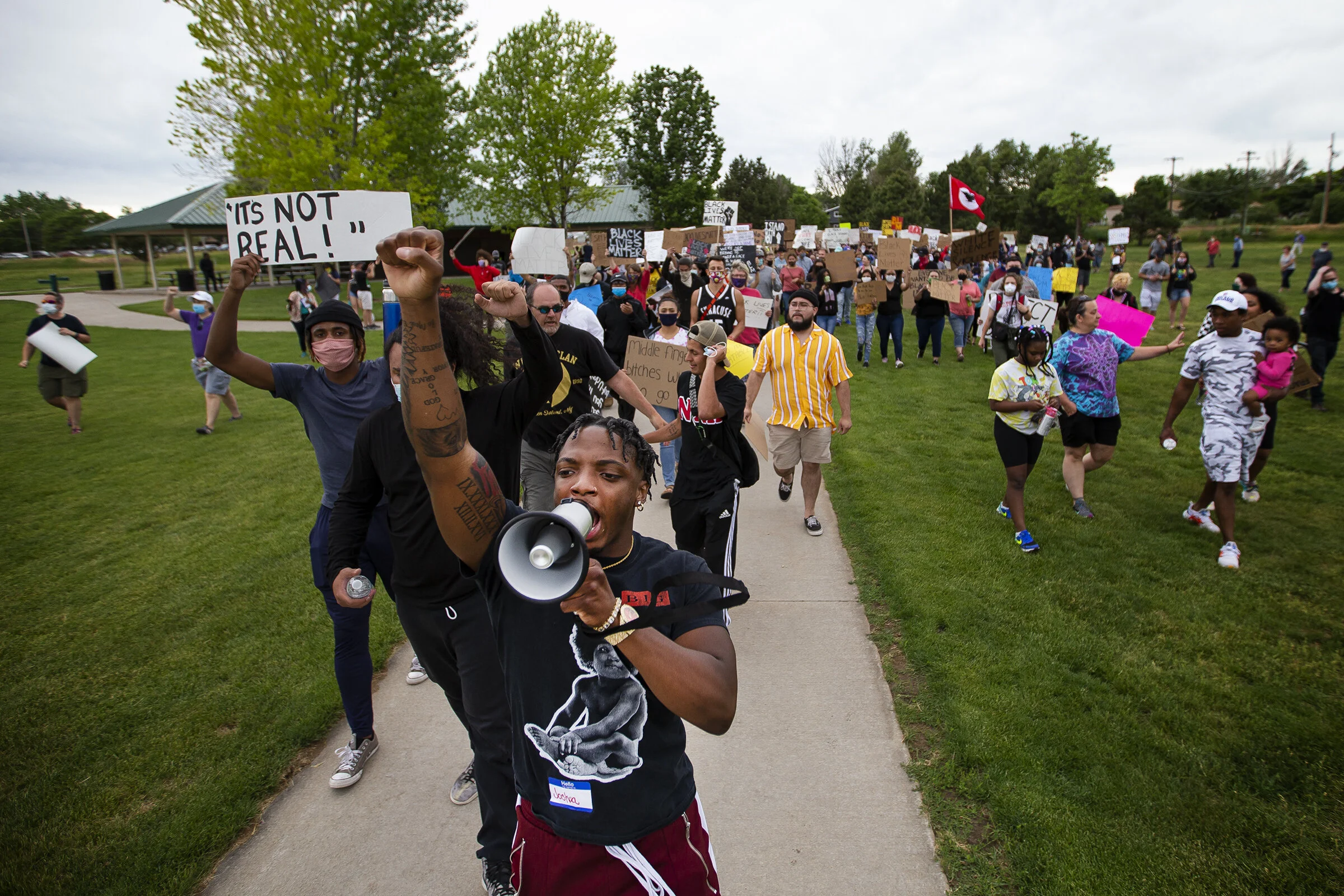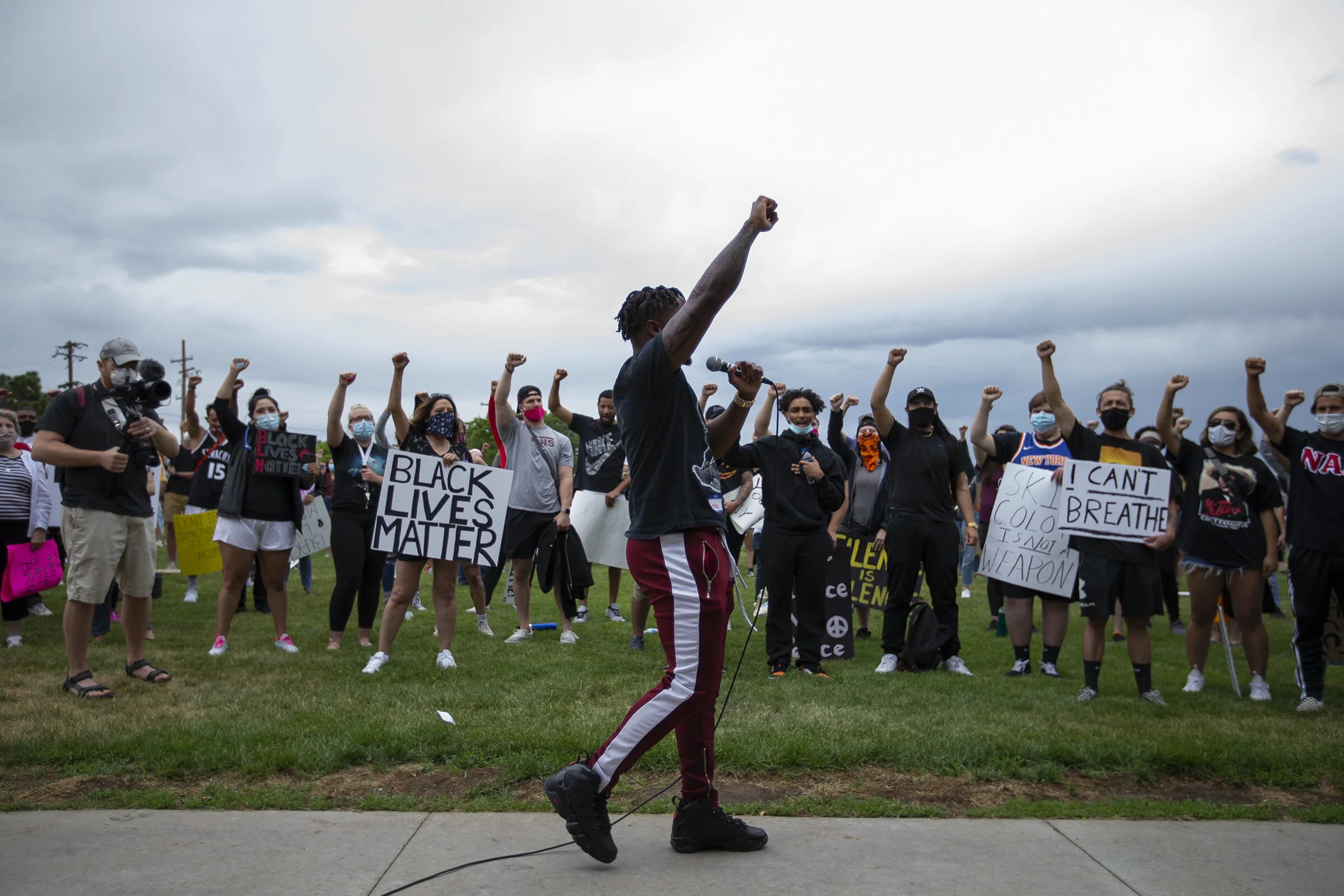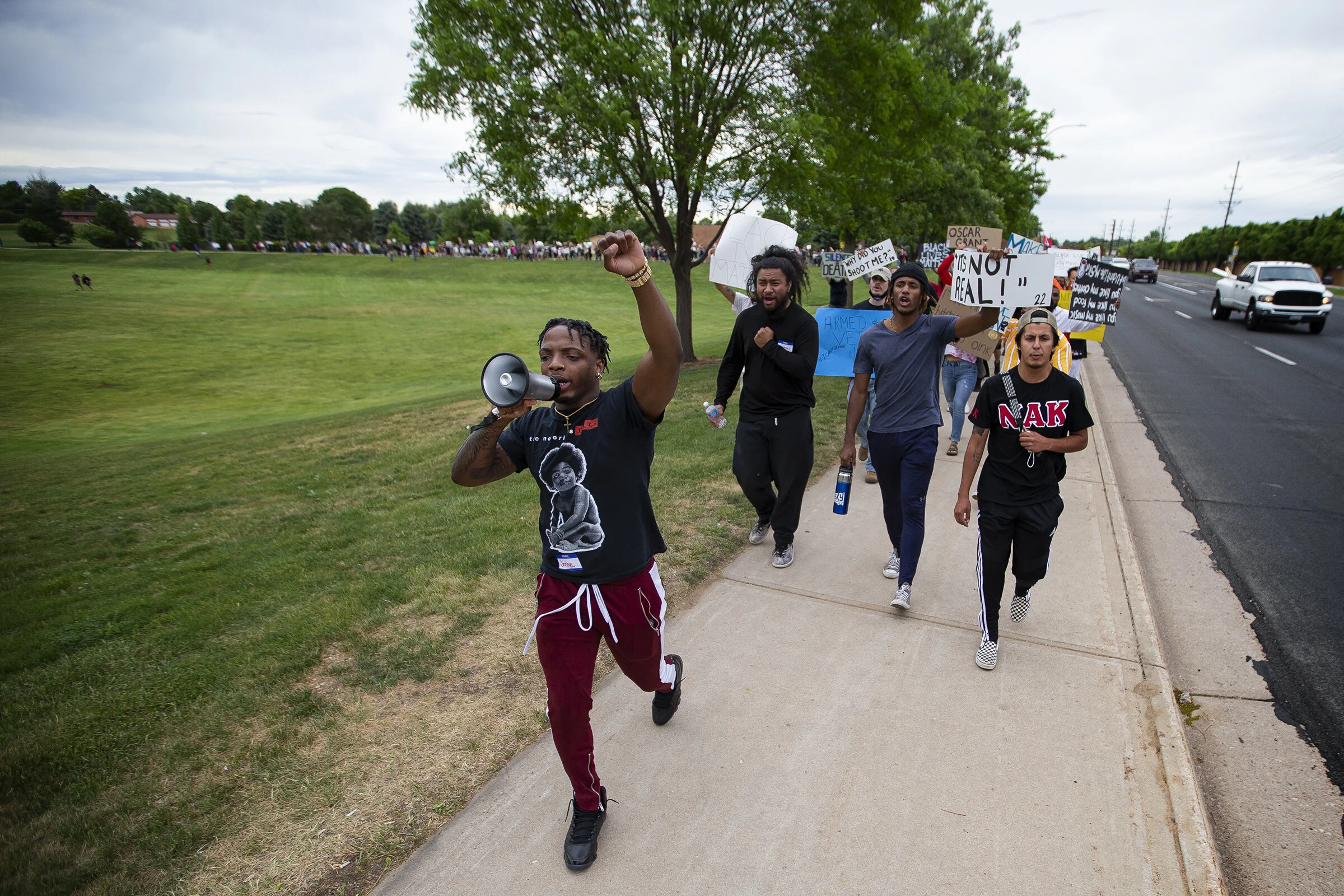Meet Josh Greer, the UNC student leading protests and calling for an end to police brutality
Josh Greer helps to lead a Black Lives Matter protest Friday, June 5, 2020. Photo by Joshua Polson.
By Kelly Ragan
Josh Greer was in elementary school when he experienced racism for the first time. He didn’t fully understand it then. He just knew he badly wanted to be friends with a group of white boys who always played together.
But they didn’t want to be his friend. Greer didn’t have the word for it then, but he knew it was because he was different. Soon, his teacher intervened and told Greer it would be best if didn’t play with them.
Greer has a word for it now: racism. He felt that hostility more as he grew up and especially when he moved to Nebraska for his freshman year of college.
But Greer found his place, and he’s working for change.
“It would be easier to throw in the towel,” Greer said. “But I don’t want my children or grandchildren to feel these things. That’s what keeps me going.”
Greer is a student at the University of Northern Colorado majoring in communications and psychology with a minor in Africana Studies. He grew up in Aurora and has lived in Greeley for about three years. He’s also president of UNC’s Black Student Union.
Recently, Greer’s captured local headlines for leading several Black Lives Matter protests, speaking up at city council meetings and calling to defund the police.
Josh Greer helps to lead a Black Lives Matter protest Saturday, June 6, 2020. Photo by Timothy Hurst.
There have been at least four major protests, several featuring Greer as a speaker, and many in Denver and across the nation in the weeks since George Floyd, a Black man, died at the hands of Minneapolis police officers May 25.
Protestors have called for justice for Floyd, Breonna Taylor, and more who they say died due to police brutality.
In Colorado, there have been increasing calls for Colorado officials to reopen the investigation into the death of Elijah McClain. McClain was a 23-year-old Black man when he died in 2019 after Aurora police officers used a carotid hold on him, according to a report by USA Today.
“The protests were needed,” Greer said. “But it can’t stop at protests.”
Greer spoke June 16 at a city council meeting and called for city councilmember Kristin Zasada to resign following a Facebook post that garnered widespread attention within the community.
Greer said he went to the meeting not in an effort to diminish Zasada’s character, but to bring attention to an issue that can have deadly consequences for black people.
It wasn’t the first time Greer spoke at a public meeting. Last year, when Colorado State University students posted pictures in blackface, he went to Fort Collins to speak to the Associated Students of Colorado State University, the university’s student government.
As UNC’s Black Student Union president, Greer said, he’s heard of a couple incidents on UNC’s campus as well. A couple students, he said, complained that a professor said they looked like thugs when they wore hoodies to class.
In 2018, stickers affiliated with the white supremacist group Identity Evropa appeared on UNC’s campus.
But, Greer said, at UNC he discovered multicultural classes and he joined the Black Student Union. He realized he wasn’t alone and realized he could make a difference.
“If I never pursued a college degree, we wouldn’t be having this conversation today,” Greer said. “I wouldn’t have realized I could be a catalyst of change for the liberation of my people.”
As the protests die down, Greer said he wants to see more attention on reconstructing police departments. That funding could instead go to other systems, such as schools, health care and more, he said.
What does it mean to defund the police?
Advocates across the state generally agree that defunding the police doesn’t mean getting rid of police departments. Rather, it means allocating some funds to better support mental health response, family counselors and more, according to a report by 9 News.
In a column for the Washington Post, Christy Lopez, a professor at Georgetown Law School and co-director of the school’s Innovative Policing Program wrote this:
“To fix policing, we must first recognize how much we have come to over-rely on law enforcement. We turn to the police in situations where years of experience and common sense tell us that their involvement in unnecessary, and can make things worse…Police themselves often complain about having to do ‘too much,’ including handling social problems for which they are ill-equipped.”
Weld County Sheriff Steve Reams responded to the concept of defunding the police following a Greeley Tribune article on the subject via Facebook post.
“I will agree that law enforcement is asked to respond to a multitude of calls that really have no law enforcement component,” Reams wrote. “When talks of ‘defunding’ the police are mentioned as a way to refocus law enforcement only on their primary mission there may be some merit to the discussion.”
Josh Greer, a University of Northern Colorado student, has recently captured headlines for leading protests, speaking at city council meetings and calling to defund police. Photo by Timothy Hurst.
Indeed, the Greeley Police Department has been working for years to expand training and partnerships to deal with an increase in mental health calls – especially suicide calls.
In a 2016 interview with The Greeley Tribune, police officer Ryan Oettinger said, “we’re obviously not psychiatrists, but we have to play that role a lot.”
Beyond conversations around restructuring police funding, Gov. Jared Polis recently signed Senate Bill 217, a sweeping police accountability bill, into law.
The bill had bipartisan support. It changed rules around deadly force, changed reporting requirements, established a requirement for other officers to intervene if they see inappropriate activity from another officer, requires all officers to wear body cameras, allows officers to be sued as individuals, and more.
At a city council meeting June 9, Greeley Police Chief Mark Jones said GPD is ahead of the curve.
“I’m not saying the department is perfect,” Jones said. “But we’ve been working for years to address the issues we’re seeing across the nation.”
Josh Greer has helped to lead three major Black Lives Matter protests in Greeley. In an interview with the NoCo Optimist, Greer said this isn’t a moment or a movement — it’s a revolution. Photo by Timothy Hurst.
As for Greer, he hopes to put a spotlight on Greeley Police Department. It’s important, he said, for people in power to be held accountable.
“They believe they are omitted from this conversation, but they are not,” Greer said.
Greer’s parents, both pastors in Aurora, tell him to be careful. If COVID wasn’t enough to worry about, rising tensions between police and the Black community certainly cause them some concern.
But Greer’s used to it. He’s the youngest of eight children, and he was always known as the rebellious one in his Christian home. While he has tattoos and piercings, his faith is an important part of his life.
It’s impossible to separate from his heart for activism.
“People tell me I’m going to be a pastor like my dad,” Greer said with a laugh. “It’s whatever God has for me. Martin Luther King Jr. was a reverend and activist, so who knows. I always ask God to lead me and guide my path.”




